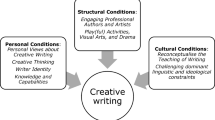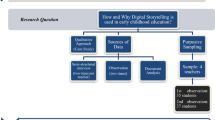Abstract
In introducing the works included in this special issue, this essay identifies some general ways that these and other narratives can function in ethical explorations in the field of education. The essay not only articulates ways that narratives can be useful to education scholars, but it also provides pedagogical reasons to connect stories with ethics in classrooms. It concludes with a brief nod to the dangers that Plato, contemporary scholars and teachers have about combining narratives with ethical inquiry, and touches upon some ways to temper them.
Similar content being viewed by others
Notes
The value of using narratives in any classroom depends upon the perceptive and facilitative skills of teachers. Teachers can have constructive aims, choose excellent material to work with and still fall short in their work with stories. For more on what the skilled teaching of narratives might entail (see Verducci and Katz 2011).
References
Bingham, C., Dejene, A., Krilic, A., & Sadowski, E. (2012). Can the taught book speak? Philosophy of education 2012. Urbana-Champaign, IL: Philosophy of Education Society.
Booth, W. C. (1988). The company we keep: An ethics of fiction. Berkeley, CA: University of California Press.
Brudney, D. (1990). Knowledge and silence: The golden bowl and moral philosophy. Critical Inquiry, 16(2), 397–437.
Bruner, J. (1987). Actual minds, possible worlds. Cambridge, MA: Harvard University Press.
Campbell, J. (1949). The hero with a thousand faces. Princeton, NJ: Princeton University Press.
Coleridge, S. T. (1817). Biographia literaria, chapter XIV. http://www.gutenberg.org/catalog/world/readfile?fk_files=3275678.
Dewey, J. (1910/2008). How we think. In J. Boydston (Ed.), John Dewey: The later works, 1925–1953 (Vol. 8). Carbondale, IL: Southern Illinois University Press.
Dewey, J. (1934). Art as experience. New York: Perigree Books.
Eagleman, D. (2011). Incognito: The secret lives of the brain. New York: Pantheon Books.
Frank, A. W. (1995). The wounded storyteller: Body, illness and ethics. Chicago: University of Chicago Press.
Goodson, I. F., Biesta, G., Tedder, M., & Adair, N. (2010). Narrative learning. New York: Routledge.
Greene, M. (1995). Releasing the imagination: Essays on education, the arts and social change. San Francisco: Jossey-Bass.
Hardy, T. (1979). A mere interlude. In S. Hill (Ed.), The distracted preacher and other tales (pp. 99–133). London: Penguin Classics.
Kahneman, D. (2011). Thinking, fast and slow. New York: Farrar, Straus and Giroux.
Marshall, E. O. (2003). Making the most of a good story: Effective use of film as a teaching resource for ethics. Teaching Theology and Religion, 6(2), 93–98.
Morgenstern, E. (2011). The night circus. New York: Doubleday.
Newton, A. Z. (1995). Narrative ethics. Cambridge, MA: Harvard University Press.
Norris, D. B. (2001). Narrative, ethics and pain: Thinking with stories. Narrative, 9(1), 55–77.
Nussbaum, M. (1983). Flawed crystals: James’s The Golden Bowl as moral philosophy. New Literary History, 15, 25–50.
Nussbaum, M. (1990). Love’s knowledge: Essays on philosophy and literature. Oxford: Oxford University Press.
Plato. (1968/1991). The republic of Plato (A. Bloom, Trans.). New York: Basic Books.
Polkinghorne, D. (1988). Narrative knowing and the human sciences. Albany: SUNY Press.
Roberts, R. (2012). Narrative ethics. Philosophy Compass, 7(3), 174–182.
Shanley, J. P. (2005). Doubt: A parable. New York: Theatre Communications Group.
Spark, M. (1961/1999). The prime of Miss Jean Brodie. New York: Harper Perennial.
Suzuki, S. (1973). Zen mind, beginner’s mind: Informal talks on Zen meditation and practice. Boston: Weatherhill.
Verducci, S., & Katz, M. S. (2011). Doubt and the framing of virtue through film. In J. Devitis & T. Yu (Eds.), Moral and character education: A reader. New York: Peter Lang.
Acknowledgments
My gratitude goes to Michael Katz, Ron Glass, and Gert Biesta for their critical eyes and constructive comments on this essay.
Author information
Authors and Affiliations
Corresponding author
Rights and permissions
About this article
Cite this article
Verducci, S. Introduction: Narratives in Ethics of Education. Stud Philos Educ 33, 575–585 (2014). https://doi.org/10.1007/s11217-014-9411-x
Published:
Issue Date:
DOI: https://doi.org/10.1007/s11217-014-9411-x




